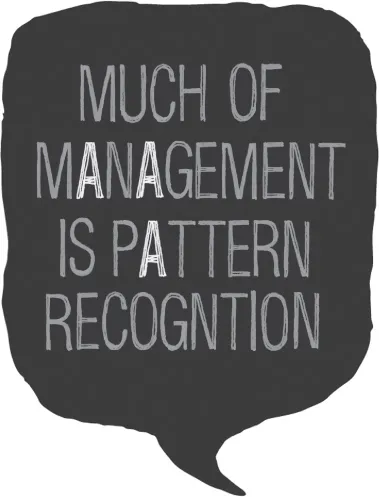
eBook - ePub
Management Rules
50 New Rules for Managers
Jo Owen
This is a test
Share book
- English
- ePUB (mobile friendly)
- Available on iOS & Android
eBook - ePub
Management Rules
50 New Rules for Managers
Jo Owen
Book details
Book preview
Table of contents
Citations
About This Book
Let's face it, if you want to get ahead in business you cannot avoid people management – but we're often promoted because we're good at what we do, not because we display great management skills. We owe it to the people we manage to read up on the subject and get skilled! Luckily Jo Owen has laid out 50 essential lessons we need to learn to become the best manager we can be.
Jo has studied what makes a good manager everywhere from British soap powder companies, to inner city schools and Japanese banks. So whether becoming a manager has brought out the inner dictator in you or left you feeling painfully awkward, Management Rules will have you relaxed, confident and effective in no time.
Frequently asked questions
How do I cancel my subscription?
Can/how do I download books?
At the moment all of our mobile-responsive ePub books are available to download via the app. Most of our PDFs are also available to download and we're working on making the final remaining ones downloadable now. Learn more here.
What is the difference between the pricing plans?
Both plans give you full access to the library and all of Perlego’s features. The only differences are the price and subscription period: With the annual plan you’ll save around 30% compared to 12 months on the monthly plan.
What is Perlego?
We are an online textbook subscription service, where you can get access to an entire online library for less than the price of a single book per month. With over 1 million books across 1000+ topics, we’ve got you covered! Learn more here.
Do you support text-to-speech?
Look out for the read-aloud symbol on your next book to see if you can listen to it. The read-aloud tool reads text aloud for you, highlighting the text as it is being read. You can pause it, speed it up and slow it down. Learn more here.
Is Management Rules an online PDF/ePUB?
Yes, you can access Management Rules by Jo Owen in PDF and/or ePUB format, as well as other popular books in Business & Business General. We have over one million books available in our catalogue for you to explore.
MANAGE YOUR TEAM
CHAPTER 1
WHAT YOUR TEAM WANTS FROM YOU

Much has been written about managers and how they can excel. But more or less nothing has been written about what followers expect from their manager. So I spent two years finding out by asking followers across industries and continents what they want from their boss. Followers consistently expect their boss to show five qualities:
- Vision
- Ability to motivate
- Decisiveness
- Good in crises
- Honesty and integrity
From the perspective of your followers, these are the new rules of management. Do well on these qualities, and you will be seen as a good boss.
There is plenty to like about what is in this list, and what is not in this list.
The good news is that the top four qualities can all be learned. And followers do not require their leaders to be charismatic and inspirational. This is just as well: most of us were not born charismatic and you cannot train people to be charismatic. But you must learn how to master the basic skills of management and meet the expectations of your bosses and colleagues. If you do this, you can become devastatingly effective and professional. As a result, people may even start to think you are inspirational.
Words can mean anything, especially on planet business. So the following sections decipher the words that followers use to describe their ideal boss, and show how you can live up to their expectations.
CHAPTER 2
VISION: SETTING A DIRECTION

Should managers have visions? In the past, managers were mere ciphers between top management and workers: they carried orders down the chain of command and fed information back up. Managers now have to do more: they have to take control and make things happen. So you need a plan, but is that a vision?
Perhaps a vision is too grand. But your team definitely wants to know where they are going and how they are going to get there. You have to give them a sense of direction and purpose. You can do that by telling them a simple story about your direction:
- This is where we are
- This is where we are going
- This is how we will get there
Once you have told them that story, you have given them the vision they want. You are now a fully qualified visionary. As a practical visionary, you do not predict the future; you create the future. That is the purpose of your story.
To make the story really motivational, you add a fourth ingredient: “This is your important role in helping us get there”. Show how each team member can contribute and you give them both meaning and purpose. Visions only work when they are personal: each of your team members must see what it means for them. Increasing earnings per share is not a highly motivational vision: creating delighted and loyal customers or achieving a challenging task are more relevant, immediate and motivational visions.
Many things in management which seem sophisticated and complicated are very simple in practice. Visions can be as grand or as simple as you choose.
CHAPTER 3
HOW TO MOTIVATE YOUR TEAM: PRINCIPLES
For the unwary, motivation can be like quicksands. At one end of the spectrum there are the motivational speakers who tell you about climbing up Everest on a pogo stick, naked and backwards. This is meant to inspire us to manage better. At the other end there are the Scrooge-type managers who snarl “Bah! Humbug!” at the mention of motivation or Christmas.
Most of the principles of how to motivate a team are well known. Your team will feel well motivated if they:
- Work for a worthwhile cause
- Have a meaningful role
- Feel supported in their role
- Have good colleagues
- Are recognised for their efforts
- Feel secure as a member of the team
Turn this around for a moment: how motivated would you be if you felt you worked for a worthless firm, had a meaningless role, you got no support, your colleagues sucked, you never got any recognition and you lived in total insecurity?
Within all these basic principles there was one question which consistently predicted whether the boss would be well rated by the team: “My boss takes a personal interest in me and my career” (agree/disagree).
So in all the formal research, humanity peeps through: if we feel well cared for, we respond positively. Find time to invest in each of your team members. Understand who they are and what they want. If you care for them, they will care for you.
If this sounds easy, it isn’t. Most managers rated themselves highly on their motivational talent. Most of their followers rated them low. Naturally, most bosses never hear this criticism from their team: either they do not ask or the team is too diplomatic to tell the truth. To put this positively, if you can put in the time and effort to show that you care for your team, you will be well ahead of your peers. You will also find you have a motivated and supportive team.
CHAPTER 4
HOW TO MOTIVATE YOUR TEAM: PRACTICE

You do not need books or psychobabble to work out how to motivate people. Start by thinking about the best boss you have ever worked for. What did the boss do to motivate you so well? Do you do the same things with your team?
In practice, most of us respond to some simple motivational measures. Here are my top ten:
1. Show you care for each member of the team, and for their career. Invest time to understand their hopes, their fears and dreams. Casual time by the coffee machine, not a formal meeting in an office, is the best way to get to know your team members.
2. Say thank you. We all crave recognition: we want to know that we are doing something worthwhile and we are doing it well. Make your praise real, for real achievement. And make it specific. Avoid the synthetic one-minute manager praise (“gee, you typed that email really well … ”).
3. Never demean a team member. If you have any criticism, keep it private and make it constructive. Don’t scold your team members as if they are schoolchildren: treat them as partners and work together to find a way forward.
4. Delegate well. Delegate meaningful work which will stretch and develop your team member. Yes, there is routine rubbish to be delegated, but delegate some of the interesting stuff as well. Be clear and consistent about your expectations.
5. Have a clear vision. Show where your team is going and how each team member can help you all get there. Have a clear vision for each team member: know where they are going and how they can develop their careers.
6. Trust your team. Do not micro manage them. Have courage to implement MBWA: Manage By Walking Away.
7. Be honest. That means having difficult, but constructive, conversations with struggling team members. Don’t hide or shade the truth. Honesty builds trust and respect.
8. Set clear expectations. Be very clear about promotion prospects, bonuses and the required outcome of each piece of work. Assume you will be misunderstood: people hear what they want to hear. So make it simple, repeat it often and be consistent.
9. Overcommunicate. Listen twice as much as you speak. Then you will find out what is really going on, what drives your team members and you can act accordingly.
10. Don’t try to be friends. It is more important to be respected than liked: trust endures whereas popularity is fickle and leads to weak compromises. If your team trusts and respects you, they will want to work for you.
As with all things that sound simple, in practice it is very hard to do all of this consistently well. It is high effort, but normally very high reward. A motivated team will climb mountains that unmotivated teams do not even look at.
CHAPTER 5
MAKING DECISIONS IN AN UNCERTAIN WORLD

Being decisive sounds like one of those vague qualities like business sense, or acumen, or charisma which you are either born with or without.
Fortunately, decisiveness is a management art that can be learned. Many management decisions are very easy. It is dealing with the tricky decisions where you prove your worth. Faced with a tricky decision, managers will usually ask themselves a series of questions which will soon decide the answer:
- Do I recognise this pattern? Much of management is pattern recognition. Once you have seen the same movie several times, you know what happens next. Decide accordingly.
- What does my boss want? At worst, this can lead to a game of second guessing which is counter-productive. But you should have a clear idea of the priorities of the boss and of the firm as a whole: this may guide you in one direction or another.
- What does my team want? If the boss is indifferent about which course of action is best, then talk to your team. It is better to run with a decision which they believe in and are committed to than imposing a decision that may be marginally better but they hate.
- What are our values? Most firms have basic beliefs about what is right and wrong: does your organisation put profits, staff, customers, the environment or something else first? There is always a pecking order of values that should guide you.
Inevitably, these questions may give conflicting guidance. At which point it is worth remembering that decision making is not a rational act in most organisations. It is a political act which speaks volumes about perceived priorities. A decision is only as good as the extent to which it is accepted. The more marginal a decision is, the more important it is to build a coalition in support of the decision. You have to spend time working...